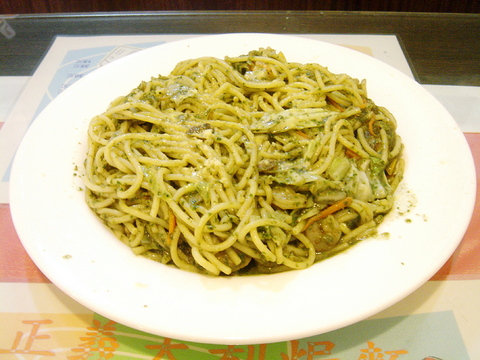Chen Yu-lung (陳佑龍), 58, had worked as a painter for four decades when he decided to try something new. So he opened an Italian restaurant.
More than a year later his Chencheng Yidali Chumien, which means "real Italian gratin," draws a steady flow of office workers, middle-aged couples and students from nearby Taipei Medical University (台北醫學大學).
Customers are greeted by Chen, who usually wears a white undershirt and reads newspapers at the table nearest the kitchen while his wife, Yang Shu-juan (楊淑娟), cooks in the back. On a recent visit, the radio was playing a song from Phantom of the Opera, while two older women tucked into a plate of green pasta.

PHOTO: RON BROWNLOW, TAIPEI TIMES
With the exception of the restaurant's name, which is displayed in Chinese on a yellow sign, little effort is made to alert the unacquainted passer-by to the unusual nature of Chen and Yang's fusion cuisine. Only the Italian pepper shakers on each table indicate that something different is happening here.
And it is different. A popular option is the bacon pesto stir-fry (培根松子綠醬炒麵). There's pesto and bacon, but also cabbage and carrots julienne mixed with spaghetti. Chen adds a dollop of Knorr pesto sauce, which he imports for NT$300 a bottle, to make his sauce more authentic. The seafood pesto stir-fry (海鮮松子綠醬炒麵) substitutes the bacon with shrimp, mussels and squid.
Customers can choose from spaghetti, penne or rice for the gratin dishes, which include bacon cream (奶油培根焗麵), black pepper beef with cheese (黑胡椒牛肉起士焗麵) and curry cheese (
Chencheng Yidali Chumien is an alternative to the usual lunchbox restaurants, and several dishes are priced at NT$70 or less. One of the more unusual of these is the qing shuang, or refreshing pasta (清爽燴麵). This contains asparagus and other vegetables along with bacon, squid or shrimp and is covered in an opaque white sauce made from flour and cream.
Chen borrowed most of the recipes from his younger brother, who runs a similar establishment in Xizhi (汐止). The qing shuang pasta was slightly bland, but Chen came up with the pesto stir-fries on his own, and these are the best dishes.
Still, both made for hearty meals at a good price, and both had plenty of vegetables.

May 18 to May 24 Pastor Yang Hsu’s (楊煦) congregation was shocked upon seeing the land he chose to build his orphanage. It was surrounded by mountains on three sides, and the only way to access it was to cross a river by foot. The soil was poor due to runoff, and large rocks strewn across the plot prevented much from growing. In addition, there was no running water or electricity. But it was all Yang could afford. He and his Indigenous Atayal wife Lin Feng-ying (林鳳英) had already been caring for 24 orphans in their home, and they were in

On May 2, Chinese Nationalist Party (KMT) Chairman Eric Chu (朱立倫), at a meeting in support of Taipei city councilors at party headquarters, compared President William Lai (賴清德) to Hitler. Chu claimed that unlike any other democracy worldwide in history, no other leader was rooting out opposing parties like Lai and the Democratic Progressive Party (DPP). That his statements are wildly inaccurate was not the point. It was a rallying cry, not a history lesson. This was intentional to provoke the international diplomatic community into a response, which was promptly provided. Both the German and Israeli offices issued statements on Facebook

President William Lai (賴清德) yesterday delivered an address marking the first anniversary of his presidency. In the speech, Lai affirmed Taiwan’s global role in technology, trade and security. He announced economic and national security initiatives, and emphasized democratic values and cross-party cooperation. The following is the full text of his speech: Yesterday, outside of Beida Elementary School in New Taipei City’s Sanxia District (三峽), there was a major traffic accident that, sadly, claimed several lives and resulted in multiple injuries. The Executive Yuan immediately formed a task force, and last night I personally visited the victims in hospital. Central government agencies and the

Australia’s ABC last week published a piece on the recall campaign. The article emphasized the divisions in Taiwanese society and blamed the recall for worsening them. It quotes a supporter of the Taiwan People’s Party (TPP) as saying “I’m 43 years old, born and raised here, and I’ve never seen the country this divided in my entire life.” Apparently, as an adult, she slept through the post-election violence in 2000 and 2004 by the Chinese Nationalist Party (KMT), the veiled coup threats by the military when Chen Shui-bian (陳水扁) became president, the 2006 Red Shirt protests against him ginned up by